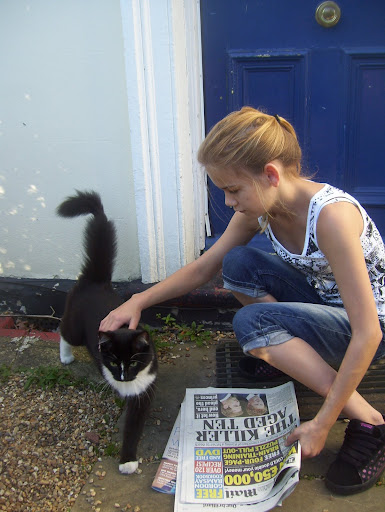
The picture is of Emily speaking to one of the cats she meets every morning as she does her paper round.
I never realised, before we changed countries, the extent to which cat care is culturally determined.
In South Africa, cats come and go as they please, pretty much. They come home to eat, and, while they may choose to spend most of their time in their own house and garden, they are also free wander round the neighbourhood if they so choose. And nobody thinks that's odd, they think that's just the way cats are. Independent.
In the US - or at least, where we lived in the US - it's considered reckless and unkind to the cats to let them into the garden, because they might wander off, and possibly get hit by a car, or catch a disease. So they have "house cats". Cats which are confined to the house, basically. And nobody thinks that's odd, or cruel (even if they see their cats desperately trying to make a break for it every time the front door opens) - it's the accepted wisdom on cat rearing.
And here in England, it's the same as it is in South Africa. Having an "indoor cat" is unheard of - unless there's something wrong with the cat, like it's blind, for instance.
What's interesting is that both sides are quite certain that they are right about what's best for cats. But I wonder if the English people would hold the opposite views if they'd happened to have grown up and learned about cats in the US, and vice versa?
7 comments:
I know people here, in the U.S obviously, on both sides of the cat rearing issue. Personally I find it odd to keep cats inside the house and I HATE the smell of a litter box. because even though people say that you can't smell it, yes you can.
Our neighbor's cat is over in our yard all the time. So much in fact that we call it by a different name and I have told the children that it is as close as they will ever get to owning one so they should enjoy it ;-)
I really like both ideas - especially dependent upon the personality of the cat. But, I can't handle irresponsible pet owners who have not spayed or neutered and then one finds stray/feral kits all over the neighborhood. I think if a kitten is born inside - it is used to that, and not constantly hoping for an escape (but who really knows the mind of a cat? ;-))
There's the same argument about dogs...
biz
My town has a law that states cats are not allowed out, they are classed as vermin as they kill native wild life. Cat owners are encouraged to build outdoor cages not unlike a bird aviary for their cat, they are quite big and take up a lot of garden space. The council will send you a trap to catch unruly cats and take them to the pound for you, the owner then has to pay a fine to get their cat back. It really is a huge issue here in Australia.
My local council is moving towards compulsory desexing and curfews for cats. I absolutely support it.
I have one cat who is an indoor cat by choice and one who is an ex-feral cat who is mostly indoors but gets really irked when I shut him in at night.
Maddy where are you? I didn't know that anywhere had gone as far you describe. I think it's absolutely right to control cats like that but we're only beginning.
Interesting to read the Aus. perspective! Funnily enough they were discussing Australia's feral cat problem on the radio this morning when we were driving down to Portland!
"I wonder if the English people would hold the opposite views if they'd happened to have grown up and learned about cats in the US, and vice versa?"
Your kids would be the ones to ask, having grown up in different areas, yes? I wonder if they have different ideas about what's most humane.
Their ideas are more influenced by us than by the prevailing norms, though...
Post a Comment